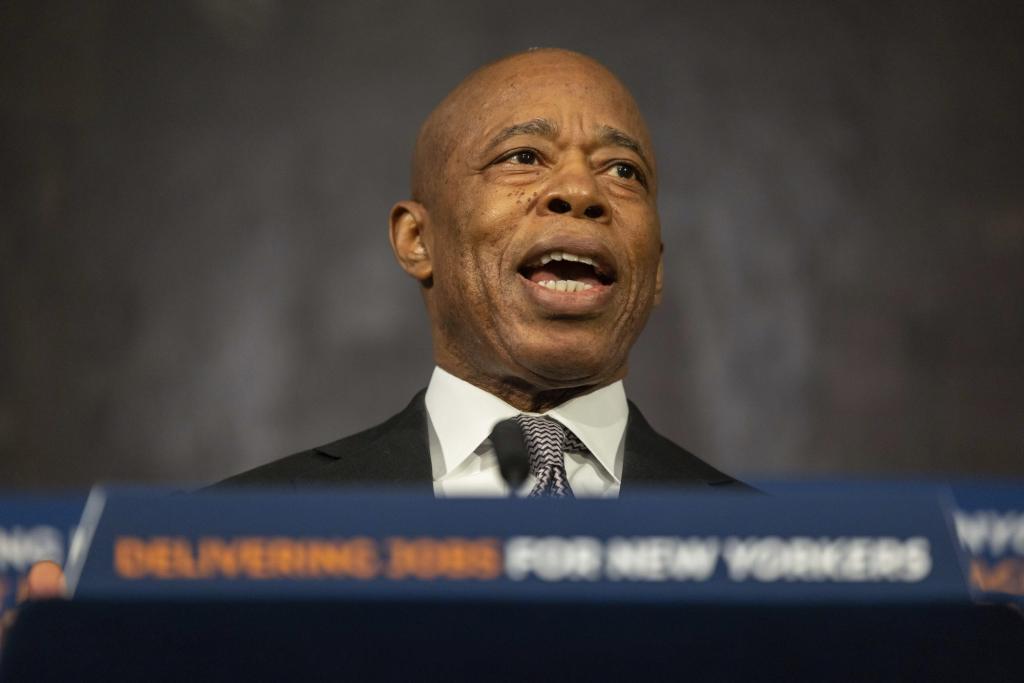World
NYC Mayor Eric Adams reacts to ‘possibility’ DOJ is moving to toss charges in corruption, bribery case

A Developing Story: Mayor Eric Adams and the Federal Corruption Case
New York City Mayor Eric Adams found himself at the center of a politically charged legal drama on Monday night when news broke that the Department of Justice (DOJ) had directed the Southern District of New York to dismiss the historic indictment against him. The revelation came as Adams was dining with supermarket mogul John Catsimatidis, a moment captured by a Fox News reporter. Adams, known for his straightforward communication style, offered a measured response to the sudden development. "We’re going to find out more information, I don’t have much now," he said, according to footage posted on X. The 64-year-old mayor emphasized that he needed to consult with his legal team before making further comments, underscoring the delicate nature of the situation.
Adams’ Response: Caution and Clarity
Adams’ cautious approach to addressing the news reflects the gravity of the matter. When pressed for details, he explained, "We were just notified of the possibility that the DOJ has communicated with the local US Attorney’s office here. I would like to speak to [my lawyer] first and get a better understanding of exactly what’s taking place now because right now I don’t have any information." His words highlighted the uncertainty surrounding the case and the need for clarity before making any definitive statements. As he spoke, Adams revealed that his phone was inundated with calls, further illustrating the rapid unfolding of events. Despite the chaos, he maintained a composed demeanor, choosing not to speculate or provide unfounded insights.
The DOJ’s Position: A Political Motivation?
The DOJ’s decision to intervene in the case has sparked significant debate, particularly given the timing. In a letter obtained by The Post, Acting Deputy Attorney General Emil Bove instructed the US Attorney of the Southern District of New York to dismiss the pending charges against Adams. Bove argued that the charges, which were brought during the Biden administration, were politically motivated. Specifically, the DOJ contended that the indictment was retaliation for Adams’ vocal criticism of President Biden’s handling of the migrant crisis. The letter stated that the charges had "improperly interfered" with Adams’ reelection bid, particularly as the Democratic primary approaches in June. Furthermore, Bove asserted that the charges had "unduly restricted" the mayor’s ability to focus on critical issues such as violent crime and the influx of migrants in New York City.
Adams’ Legal Battles and Political Maneuvering
Adams, who has denied any wrongdoing, has long maintained that the charges against him were politically driven. He has characterized the indictment, which was handed down in September, as retribution for his outspoken criticism of the Biden administration. The charges allege that Adams accepted thousands of dollars in free or upgraded luxury travel from foreign nationals in exchange for political favors. Despite these allegations, Adams has consistently asserted his innocence, framing the case as an attempt to undermine his leadership and influence. In the months leading up to the DOJ’s announcement, Adams appeared to be positioning himself strategically, making multiple trips to Washington, D.C., and meeting with former President Donald Trump in Florida just days before Trump’s inauguration. These actions have been interpreted by some as an effort to align himself with a politically powerful figure, given Trump’s continued influence within the Republican Party.
The Implications of the DOJ’s Decision
The potential dismissal of the charges against Adams carries significant implications, both legally and politically. While the move by the DOJ could pave the way for Adams to focus more intently on his mayoral duties and reelection campaign, it also raises questions about the integrity of the legal process and the role of politics in shaping justice. Critics argue that the decision may set a precedent for political interference in legal matters, potentially eroding public trust in the impartiality of the justice system. On the other hand, supporters of Adams view the DOJ’s intervention as a validation of his claims of political persecution, suggesting that the charges were indeed motivated by partisan agendas rather than a genuine pursuit of justice. If the charges are dismissed, they could still be revisited at a later time, leaving the door open for potential legal challenges in the future.
Looking Ahead: A City in Flux
As the situation continues to unfold, New Yorkers are left wondering what this means for their city’s leadership and the direction of its governance. Adams, who has been a polarizing figure throughout his tenure, faces not only legal challenges but also the daunting task of addressing the city’s pressing issues, such as crime and immigration. The possibility of the charges being dismissed has injected new dynamics into the mayoral race, with Adams’ opponents likely to seize on the controversy as a campaign issue. Meanwhile, Adams’ allies are positioning the DOJ’s decision as a vindication of his leadership and a testament to his resilience. As the city navigates this uncertain landscape, one thing is clear: the outcome of this case will have far-reaching consequences, shaping not only Adams’ political future but also the broader narrative of justice and politics in New York City. Stay tuned as this story continues to develop.











